|
|
|
Sort Order |
|
|
|
Items / Page
|
|
|
|
|
|
|
| Srl | Item |
| 1 |
ID:
130006
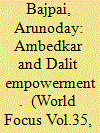

|
|
|
|
|
| Publication |
2014.
|
| Summary/Abstract |
Dr B R Ambedkar was convinced that unless the marginalized sections of Indian society secured the political power, it was not possible to completely wipe out all social, legal and cultural disabilities, from which they suffered (Desai: 1959). Thus, for the political organization and political mainstreaming of Dalits, he pleaded for their representation in legislatures in the Round Table Conferences, 1930-32, convened by the British government. Both Ambedkar and British government supported Dalit representation in the legislatures on the basis of separate electorate, which meant that in the reserved constituencies only Dalits would be allowed to vote. This was the crux of Communal Award announced by the British government in 1932.
|
|
|
|
|
|
|
|
|
|
|
|
|
|
|
|
| 2 |
ID:
106704
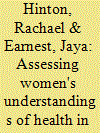

|
|
|
| 3 |
ID:
117909
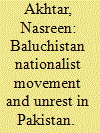

|
|
|
|
|
| Publication |
2011.
|
| Summary/Abstract |
Pakistan is one of the most complex multi-ethnic societies in the developing Islamic world. Each of the ethnic groups that now comprise Pakistan has very distinctive identity, folklore, history and political interests. However, Pakistan's nation builders were not alive to the ethnic question and failed to integrate ethnic groups into a Pakistani nationhood through recognised principles of autonomy, representation and empowerment. Instead, a non-representative, military-led authoritarian system suppressed legitimate regional and ethnic aspirations, relying too heavily on Islam and Pakistan ideology (two nation theory) to forge a sense of common nationhood. It didn't work: since the 1950s there have been four major insurrections against the central government by Baluch nationalists. Although the Baluch national question has its roots in the colonial era, it emerged as a significant political and security issue because an over-centralised and non-representative power system couldn't address the issue of ethnic diversity. Baluchistan is now a hub of interests for regional and major powers.
|
|
|
|
|
|
|
|
|
|
|
|
|
|
|
|
| 4 |
ID:
113858
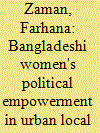

|
|
|
|
|
| Publication |
2012.
|
| Summary/Abstract |
Despite notably increased female involvement in local political bodies in Bangladesh, women continue to face multifarious problems in ongoing processes of shaping political institutions. Stereotypical gendered assumptions about divisions of labour continue to discourage such women from being present and active in the political arena. The article shows that this is not just a matter of Islamic traditionality. There are other factors at work, including lack of sensitivity to such issues among female leaders. Focusing on women ward commissioners, the study reveals specifically that they are frequently unable to show their commitment to the public as they are not assigned independent wards. When women share wards with male ward commissioners, their exposure becomes somehow insignificant to the public. Fieldwork confirms that women ward commissioners firmly believe that discriminatory attitudes of their male counterparts will continue unless they are given separate wards. This supports arguments for continued affirmative action at various levels to address gender balances in South Asian politics.
|
|
|
|
|
|
|
|
|
|
|
|
|
|
|
|
| 5 |
ID:
142333
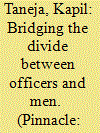

|
|
|
| 6 |
ID:
175149


|
|
|
|
|
| Summary/Abstract |
In October 2017, Canada launched its Feminist International Assistance Policy (FIAP). While Canada’s explicit use of the words “feminist” and “feminism” may be refreshing, critical questions on the FIAP’s interpretation and application of these concepts remain. These challenges are not unique to the FIAP. Rather, the central weaknesses of the FIAP can be seen as symptomatic of several endemic challenges that persist in the current policies and practices that seek to promote gender equality in the developing world and beyond. This article presents the theoretical and conceptual lineage that has informed the FIAP, drawing from challenges present within literature on security, gender equality, and gender mainstreaming. Three main shortcomings relevant to both the literature and the FIAP are explored: first, the assumptions and essentialization of “gender” to mean “women”; second, the frequent conflation of “gender equality” with “women’s empowerment”; and last, the paradox of gender, gender equality, and feminism being simultaneously over-politicized and depoliticized to suit prevailing policy environments, with particular implications for the global coronavirus pandemic, as well as impacts in fragile and conflict-affected states. This analysis sheds light on persistent challenges in feminist foreign policymaking and offers insights for the development of Canada’s White Paper on feminist foreign policy.
|
|
|
|
|
|
|
|
|
|
|
|
|
|
|
|
| 7 |
ID:
133723
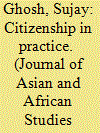

|
|
|
|
|
| Publication |
2014.
|
| Summary/Abstract |
Citizenship is essentially about membership in society which enables citizens to participate in the affairs of their community on roughly equal terms and culturally enjoins upon them to collectively surmount their commonly felt problems, such as poverty. The role of Self-Help Groups (SHGs) should be understood in this context. Through observation and conversation-analysis methods, this paper studies two SHGs in India: the successful one practiced citizenship, envisaged a sense of community and made progress towards capacity building and empowerment, especially pertaining to education, health and sanitation. It concludes that in developing countries, citizens acquire the appropriate virtues through participation in the programmes linked with their vision of well-being and thus strengthen the cause of citizenship.
|
|
|
|
|
|
|
|
|
|
|
|
|
|
|
|
| 8 |
ID:
143772
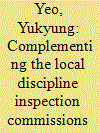

|
|
|
|
|
| Summary/Abstract |
Rampant corruption among China’s party members suggests that the existing system of party discipline is too fragile to function effectively. The question now is how the central leadership reinforces party supervision over leading cadres in both government and state firms. The Chinese leadership, after some period of experimentation, has introduced new institutions, named zhongyang xunshizu (central inspection groups), to complement the existing discipline system. This article examines how these central inspection groups complement the existing groups institutionally and normatively, and explores the Chinese Communist Party’s institutional engineering efforts to maintain legitimacy, organizational integrity and sustainability. This article considers these initiatives from the view of institutional complementarity and compensation. Theoretically, the application of institutional complementarity to China’s party discipline inspection should expand the scope of analysis into China’s institutional reform of party discipline. Empirically, the central inspection groups are the least known, but perhaps most significant, direct channel for central supervision of leaders in both local government and key state-owned enterprises. By comparing the rationale and operation of disciplinary inspection commissions (DICs), this article attempts to explain how the central inspection groups complement the supervision of local DICs in terms of scope, structure and methods of control.
|
|
|
|
|
|
|
|
|
|
|
|
|
|
|
|
| 9 |
ID:
158666
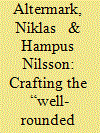

|
|
|
|
|
| Summary/Abstract |
In recent years, counterradicalization work has come to focus on empowering vulnerable communities and individuals through programs implemented by local governments and welfare services. This article examines this new regime of counterradicalization, focusing on how such programs seek to immunize people allegedly susceptible to radicalization by making them “active citizens.” In contrast to the stated ambitions of these programs and much scholarly work on prevention, we do not see counterradicalization by citizenship empowerment as a way of giving back power to the communities where terrorism emerges. Rather, these programs are set up to manage the self-image and behaviors of individuals perceived as “risky,” which means that they operate by shaping subjects. Undertaking an in-depth analysis of two programs of prevention through empowerment, we outline the rationalities underpinning this new way of countering radicalization, showing how they make use of “citizenship” as a political technology.
|
|
|
|
|
|
|
|
|
|
|
|
|
|
|
|
| 10 |
ID:
169136


|
|
|
|
|
| Summary/Abstract |
It appears that an almost unquestioned development pathway for achieving gender equity and women's empowerment has taken centre stage in mainstream development. This pathway focuses on economic outcomes that are assumed to be achieved by increasing women's access to material things, including cash income, loans, physical assets, and to markets. Gender equity indicators, which measure progress towards these outcomes, cannot escape reinforcing them. We argue that far from being neutral, indicators are embedded in political and ideological agendas that serve as guides to the appropriate conduct of those whose performance or behaviour is being measured. Drawing on participatory feminist, diverse economies and strengths based approaches, we outline a research methodology for developing community‐based indicators that recognises women's and men's participation and relationships in all spheres of life, including the ‘non‐economic’. If indicators are grounded in local meanings and realities, we propose that community members can use them to identify aspirational goals for gender equity, and measure progress towards these goals.
|
|
|
|
|
|
|
|
|
|
|
|
|
|
|
|
| 11 |
ID:
148620
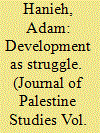

|
|
|
|
|
| Summary/Abstract |
The occupied Palestinian territories (oPt) are a major recipient of global aid flows, ostensibly aimed at improving development outcomes for the Palestinian population. This article presents a critical analysis of the ways that development is being conceived and practiced by major actors in the oPt. By analyzing different conceptions of power, the article examines how dominant approaches to development hide the ongoing reality of Israeli settler colonialism by dehistoricizing Zionism and its project; incorporating the structures of Israeli occupation into official Palestinian development strategy; and promoting an economic perspective that views development as an objective and disinterested process operating above (and outside) power relations. After considering some of the ramifications of current approaches to development, the article concludes with brief remarks on how this critique can help to reframe and articulate an alternative strategy.
|
|
|
|
|
|
|
|
|
|
|
|
|
|
|
|
| 12 |
ID:
157075
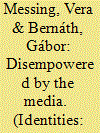

|
|
|
|
|
| Summary/Abstract |
Roma communities have experienced widespread historical exclusion in most European countries. The media can be a powerful instrument of a group’s inclusion into the mental map of a society, or, on the contrary, it can contribute to the group’s exclusion and disempowerment. This article builds on a series of content and discursive analyses of the news media’s coverage of Hungarian Roma communities since 1993, interviews with stakeholders and focus group discussions in Roma communities. It scrutinises media reporting about Roma and argues that, in general, the scope and the agenda of Roma’s portrayal coincide with mainstream society’s stereotypes about the group. The article will additionally look at the media’s disempowering role from two perspectives: on the one hand, the extent to which Roma have access to influencing media content, and on the other hand, it will consider the role of minority communities in challenging stereotypical images.
|
|
|
|
|
|
|
|
|
|
|
|
|
|
|
|
| 13 |
ID:
169038
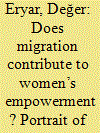

|
|
|
|
|
| Summary/Abstract |
This article empirically investigates the impact of internal migration on women’s empowerment in urban areas of Turkey. Based on data from a nationally representative household survey, we find that migration exerts a positive impact in urban settings through improvements in educational attainment and labor market outcomes. Migration contributes to women’s empowerment by raising their education levels and lowering the gap in schooling between men and women. Migration also allows migrants, both men and women and particularly those with tertiary education, to access jobs and occupations in high wage regions like Istanbul. However, unlike in education, a gender wage gap persists even after migration.
|
|
|
|
|
|
|
|
|
|
|
|
|
|
|
|
| 14 |
ID:
180621
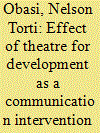

|
|
|
|
|
| Summary/Abstract |
Despite the ongoing conflict between farmers and herdsmen in Nigeria, researchers are yet to substantially focus attention on ways of empowering victims of the conflict through skills acquisition. This study attempts to fill this gap by assessing the effectiveness of theatre for development as a communication intervention strategy for positively influencing the perceptions, knowledge and behavioural intentions related to painting, weaving and fashion and design of victims of the conflict between farmers and herdsmen in Nigeria. A quasi-experiment was utilised with 470 participants. Theatre for development was found to be an effective communication intervention strategy for positively influencing the participants regarding the three arts and crafts examined. The implications of these results for human capital theory and the theory of planned behaviour are explored, and recommendations are made.
|
|
|
|
|
|
|
|
|
|
|
|
|
|
|
|
| 15 |
ID:
170268
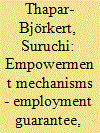

|
|
|
|
|
| Summary/Abstract |
The Mahatma Gandhi National Rural Employment Guarantee Act (NREGA) in India opens a new chapter in rural governance, signifying transformative potential for enhancing economic and social security. One of the key objectives of the Act is to aid in the empowerment of marginalised communities, especially women, Scheduled Castes (SCs) and Scheduled Tribes (STs). However, no analytically rigorous attempt has been made to study the mechanisms and processes that are leading to empowerment or even the (unintended) processes of disempowerment. Our paper investigates (dis) empowerment as a process rather than as a (quantifiable) outcome and analyses the mechanisms through which the embedded gender and caste norms are being challenged (though not completely eroded), but also how powerful actors at household, community and market levels can come to resent processes that entail upward mobility of women and marginalised communities. We draw on a comparative study based on extensive qualitative indepth interviews and participant observation, in rural areas of two Indian states, Uttar Pradesh (North India) and Andhra Pradesh (South India). The former exhibits almost all the elements we associate with low development, whereas the latter belongs to a group of southern Indian states with higher levels of human and economic development.
|
|
|
|
|
|
|
|
|
|
|
|
|
|
|
|
| 16 |
ID:
125375
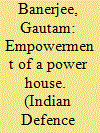

|
|
|
|
|
| Publication |
2013.
|
| Summary/Abstract |
By age-old convention, most wars have various forms of tactical operations undertaken under one overall plan - set-piece, irregular and Special Operations, for example. Indeed, the so called 'conventional war' has always had unconventional tactical recourses built into it. The infantry battalion has been in lead role in such irregular or unconventional operations, its flexibility of structure, weaponry and training allowing it to be moved by any mode of transport and fielded in any of the kind of aforesaid operations - all with equal proficiency and without much ado. The final test may, therefore, be to evaluate the significant flexibility which the infantry battalion has traditionally possessed.
"Do not wait to strike until the iron is hot but make it hot by striking." -William Sprague
|
|
|
|
|
|
|
|
|
|
|
|
|
|
|
|
| 17 |
ID:
142321
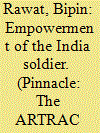

|
|
|
| 18 |
ID:
156529
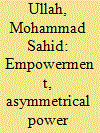

|
|
|
|
|
| Summary/Abstract |
In the wider context of growing digitalisation in South Asia, this article examines the impacts of a public–private–people partnership (4Ps) information and communication technology (ICT) initiative of the Bangladesh government, administered through local governmental offices, the Union Information Service Centre (UISC). Scrutinising the operation of six UISCs in rural communities across Bangladesh, the study researches the potential of ICTs to influence existing asymmetrical power relations and empower local people. Asking to what extent ICTs enable more people to actively participate in their communities and what the implications for empowerment are, it is found that top-down ICT intervention by itself cannot bring substantial change for people at the bottom of the social pyramid. Asymmetrical power relations continue to deprive marginalised groups from receiving the claimed benefits of ICT facilities. The study suggests the need for a more critical, practice-focused understanding of relationships between ICTs and rural empowerment, while also highlighting the changing modalities of connecting states and their citizens in postmodern South Asia.
|
|
|
|
|
|
|
|
|
|
|
|
|
|
|
|
| 19 |
ID:
146890
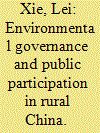

|
|
|
|
|
| Summary/Abstract |
This article investigates participatory environmental management in rural China. It first summarizes the extent, role and key drivers of public participation in environmental politics in China. It then investigates main scenarios of interaction between the Chinese public and the state, in order to assess the array of possibilities for political participation in environmental matters. This comparative study of public participation in environmental management focuses on grass-roots initiatives that point to increasing public enthusiasm for policymaking processes. The article concludes that participatory practices have impacted significantly upon environmental governance by facilitating implementation and bettering policy and, to a certain extent, legitimizing the discretion of environmental protection agencies. The article also indicates that grass-roots deliberative participation has successfully achieved its goal of improving the provision of social services and public goods. While the government’s initial approach was to improve policy implementation without triggering political contestation, at grass-roots level this strategy has created a sense of political awareness.
|
|
|
|
|
|
|
|
|
|
|
|
|
|
|
|
| 20 |
ID:
145298
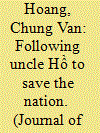

|
|
|
|
|
| Summary/Abstract |
This article investigates new religious movements that have emerged in post-Renovation Vietnam. The formation and development of movements that worship Hồ Chí Minh will be examined through the Way of the Jade Buddha. My analysis of this indigenous movement will discuss its controversial attempts to establish communication with the spirit of Hồ Chí Minh. It is argued that the movement is a channel through which people can empower themselves, seek legitimacy, and promote nationalistic aspirations. The emergence of such movements demonstrates the ongoing millenarian dream of social transformation in the face of the challenges of international integration and the tensions caused by maritime conflicts with China.
|
|
|
|
|
|
|
|
|
|
|
|
|
|
|
|
|
|
|
|
|